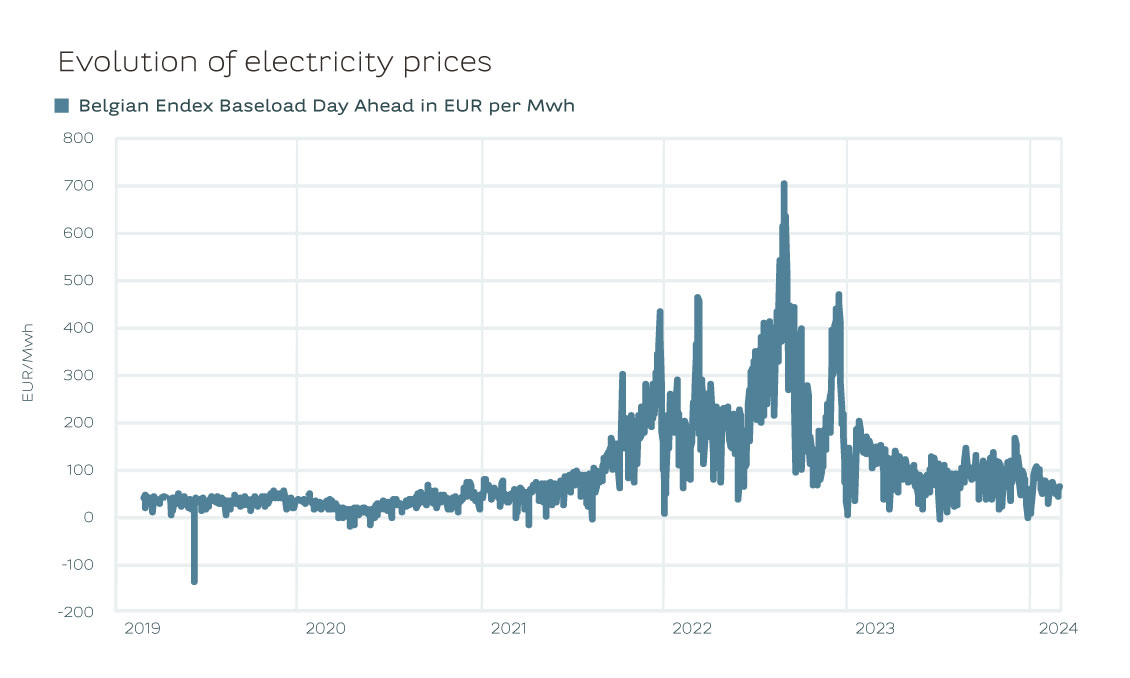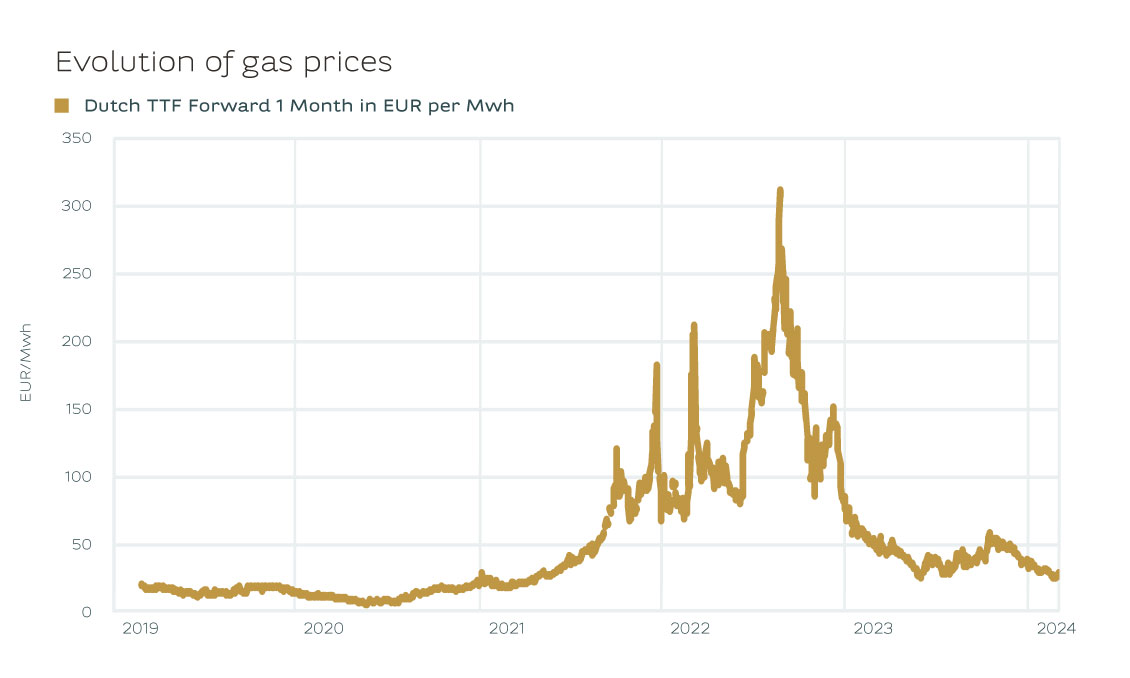Leading IT experts are predicting an upsurge in attacks against companies' computer departments. What do you need to know for a better response in 2017?

> SMEs underestimate the risks - internally
SMEs demonstrate less vigilance than large groups regarding their employees' activities which may lead to cyber security lapses. According to the survey 2016 IT Security Risks of Kaspersky Lab, 36% is afraid of negligence by their staff, compared to over half of large companies, who view this as a major concern. The survey adds that actions by employees is one of the three main security problems. 61% of companies directly affected by cyber security incidents in 2016 acknowledge that some of the incidents were attributable to the conduct of negligent or ill-informed employees.
> BYOD is a strong trend, but also a way in
Large companies and SMEs are facing the same challenge: having to manage a constantly evolving IT infrastructure which is part of the ever-changing nature of ‘Bring your own device’ (Ed: employees use their own device to access the company's network). Result: 74% of companies state that the number of smartphones used at work has risen in the last three years. This requires IT departments to step up the attention paid to IT security, but also demands strict centralised control of potentially risky activities (once again) carried out by employees.
> Ransomware will be more resilient and more targeted
2016 was the year of ransomware (malware that takes personal data hostage) within companies. This threat will continue to spread in 2017. Thanks to the considerable gains made in 2016, cyber criminals will be devoting even more resources to the automation of targeting this year, in order to extort higher sums. "Early this year, a ransomware botnet (generic term designating a group of infected computers remotely controlled by a hacker) , which we are monitoring, raked in EUR 1.4 million in just one week," explains Catalin Cosoi, Director of Security Strategy at Bitdefender.
> Botnets are now clearly threatening the internet of things
The phenomenon of IoT botnets will be on the rise this year. Many connected devices have in fact been designed without any serious thought to security. There are already millions of vulnerable connected devices. Although corrective measures do exist, standardisation methods are still relatively complex. Consequence: they will still be vulnerable. The most striking example in 2016 was Mirai, which gives an idea of the extent of potential damage to the security of connected devices: this botnet alone managed to bring the internet to a standstill for several hours, merely by targeting one of DNS' main suppliers.
09.12.2024
Managing business uncertainty with BNP Paribas Fortis
Every entrepreneur will tell you that financial markets are unpredictable, entailing inherent risks. We provide tailored solutions to protect your business as you navigate these volatile markets.
Whether you’re a small or large business, operating domestically or internationally, one thing is certain: if you enter a market and do your utmost to grow your business, sooner or later there inevitably will come a time when you expose yourself to risks. Frédéric Raxhon, Head of FI Midcap Sales, BNP Paribas Fortis Transaction Banking, is our go-to expert. Here, he explains how BNP Paribas Fortis helps customers manage this uncertainty.
Raxhon knows how market volatility can impact the daily operations of small, medium and large enterprises. Thanks to his experience of working as a banker in corporate finance, shares and derivatives, and advising holding and listed companies, he understands how the market works like no other.
Raxhon: "We are keenly aware that price uncertainty, in the form of volatility on the financial markets, can have a serious impact on the operations and profitability of businesses. That’s why we constantly monitor the markets and their volatility: if prices fluctuate sharply, our customers run the risk of buying high and selling low. The past few years are a good example of what can happen, with a sudden rise in interest rates, an energy crisis with very volatile prices, and a sharp rise in inflation. We will continue to see volatility in these markets, due to geopolitical tensions and ongoing wars. However, elections can also cause volatility, as they often cause a change in economic policy. President-elect Donald Trump has already said that he will hike tariffs on goods coming from outside the U.S., which will have an impact on global growth and inflation. The transition to a more sustainable society because of the energy transition, however positive this may be, is also a source of uncertainty. Companies will be required to make significant investments, and it is not yet clear which technologies will prevail.
All of these factors show that companies need guidance in the form of a tailor-made solution to ensure that volatile markets minimise the impact on their operations so that they can focus on their core business."
Solution-oriented
The solution to this volatility comes from a partner who is a market leader when it comes to safeguarding national and international business.
Raxhon: "At BNP Paribas Fortis, this often means managing the risks of companies that have a number of straightforward wishes: they want to conduct business on a daily basis without unnecessary complications; buy at a stable price where possible; pay wages in a stable environment; sell to customers with a profitable, stable margin, and so on. If they experience market uncertainty in their business operations, we are there to advise them and suggest solutions in different scenarios. This can range from companies that want stability when buying or selling goods in another currency, to controlling fluctuating interest rates on current or future loans, or even creating a stable financial environment in which they can steadily pay their wages. We also hedge raw materials: companies that require large quantities of energy, metal, or wheat, for example – just a few of the commodities that are subject to price fluctuations – can rely on our expertise to turn their uncertainty into certainty. When companies are calculating their budgets for the coming years at the end of the year, assumptions about budgets and costs are a factor that future markets do not take into account. This, in turn, could lead to inconsistencies in business operations during the next financial year. We regularly suggest solutions for this, which inject trust into the entire process. We help entrepreneurs make their business more resilient to market fluctuations. Because at BNP Paribas Fortis, we are always focused on finding solutions, in any given scenario."
International intelligence
Belgian companies are increasingly expanding their horizons, which is why an international perspective is so crucial.
Raxhon: "Everything is intricately connected in the economic space. The energy crisis, for example, was not a national crisis. In Belgium, electricity prices were directly impacted by the drop in nuclear power production in France in 2022. The American elections have a direct impact on international business, with anxiety gripping investors and the markets. And I can give you many more examples.
Moreover, we expect this interdependence and volatility to continue for quite some time: there are a large number of economic and global trends that are feeding this uncertainty. And that is why it is so important that we keep up with developments in this uncertain global environment. At BNP Paribas Fortis, we rely on a global network of experts who are always on the lookout for the latest updates. Whatever happens and wherever it happens, there are always people from our bank on the ground who monitor the situation and provide us with real-time advice on how best to inform our customers. This network has proven its worth time and again, both for us and our customers."
10.06.2024
Electronic invoicing between companies to become mandatory
The bill to introduce this obligation in Belgium has been submitted to the Federal Parliament. If the draft bill is approved, B2B e-invoicing will become mandatory from 1 January 2026. Our experts explain why Belgium wants to introduce these new rules, what the implications are for your company and how we can better support you.

“The bill is consistent with international developments and initiatives at the European level,” says Nicolas De Vijlder, Head of Beyond Banking at BNP Paribas Fortis. "Europe's ambition is a harmonised digital standard. Structured e-invoicing between companies will also reduce the administrative burden of invoicing, enabling companies to work more efficiently and increase their competitiveness. The automation of VAT declarations will also help governments prevent tax fraud and adjust economic policies based on more qualitative data.”
Evolution rather than a revolution
“The new legislation is an evolution rather than a revolution,” adds Erik Breugelmans, Deputy Managing Director at BNP Paribas Factoring Northern Europe. "Digitalisation is becoming pervasive at all levels of society, as we have seen with the increase in electronic payments, as well as the additional obligations in recent years regarding electronic invoicing to the government. In this sense, the bill for mandatory electronic invoicing between companies is a logical next step. Our bank is happy to contribute to this process, although we do not intend to offer the same services as accounting software or fintechs. However, we are happy to help our customers with payments and financing."
The impact on businesses
“Customers need to be aware that the new regulations will have an impact on their internal and external processes,” continues Erik Breugelmans. "The majority of Belgian companies mainly serve an international market, which means that the introduction of electronic invoicing will be more complex for them than for companies operating in the domestic market. As the legislation will be introduced in one go, they need to start preparing now."
“The new rules will affect a company’s accounting department as well as its IT department,” emphasises Nicolas De Vijlder. "The procedural requirements are key, otherwise the automated process will not work. However, one of the main benefits of advanced automation is that everything can be done faster and more efficiently. The time between sending an invoice and paying it will be shorter and cash flows more predictable. In addition, it will also reduce the risk of error and fraud, as all transactions will pass through a secure channel."
Ready to offer you even more and better support
“Thanks to the far-reaching digitisation resulting from the new regulations, we will be able to further optimise payments,” concludes Erik Breugelmans. "As a bank, we need to finance our customers’ receivables as quickly and efficiently as possible, so that they have easier access to their working capital. In addition, because we have already gone through an entire process in terms of large-scale automation, we will be able to adapt quickly to the new rules. We can also draw on the expertise of the BNP Paribas Group, which is currently developing an e-invoicing solution for large companies."
Want to know more?
Listen to the episode on B2B e-invoicing :
08.03.2024
Has your company also locked in its energy prices?
The price of energy has experienced both high highs and low lows in recent years. This yo-yo behaviour is a worry to many entrepreneurs. Once again, BNP Paribas Fortis is here to offer you stability.
Controlling the price of energy: it’s an issue that’s almost impossible to avoid, or one that has been a recurring concern in your company over the past few years? We come from a time when energy prices were very volatile, with both high highs and low lows. These fluctuations have worried many entrepreneurs and, in some cases, caused huge additional costs. There is, however, a less well-known way for entrepreneurs to carry out risk management in this area. BNP Paribas Fortis is here to advise you.
Pendulum movement
Energy prices have been on a volatile ride in recent years. After the invasion of Ukraine, they rose to unprecedented levels. Gas prices rose to EUR 300 per MWh, while in previous years they had been around EUR 10-15 per MWh. Electricity prices rose to over EUR 600 per MWh. In previous years, the price was barely EUR 50 per MWh.


Crisis management
"As a result, BNP Paribas Fortis has received an increasing number of enquiries in recent years from companies looking to financially lock in their energy prices. Typically as a company you pay a variable price to the energy supplier. While you fix the price with the bank via a financial swap. Such financial swaps are also used to hedge other commodities (metals, oil products, etc.)."
Mattias Demets, Commodity Derivatives Sales at BNP Paribas Fortis
The energy crisis of 2022 sent shock waves through the economy. Especially in energy-intensive sectors such as metallurgy or chemicals, it became clear how much affordable energy was crucial to the survival of many companies. Those that were self-sufficient in their energy needs weathered the storm better than others. The energy crisis also highlighted the importance of risk management. Companies wanted, as the legislator put it, to act like "prudent and reasonable persons" - the former "good householder principle". They fixed their energy prices and came out of the crisis virtually unscathed. While others could only hope that energy prices would come down again.
'Never waste a good crisis' is a regularly heard truism. For this energy crisis, we can use this expression once again. It’s fascinating to see companies now taking charge of their own energy supply. The rise of PPAs – Power Purchase Agreements – is particularly remarkable. A PPA is an electricity purchase agreement between a power producer and a customer.
Risk management
Companies are also making great strides in risk management. In the past, it was often up to management to lock in energy prices. They saw it as an additional responsibility to negotiate with energy suppliers. But since the energy crisis, we have seen companies become much more professional. Managing energy prices is today a job in itself. Companies are increasingly thinking about the right strategy to manage their energy costs so that their energy prices come down. How and when they lock in energy prices has become more of an informed decision than ever before, allowing them to protect their margins in the event of rising prices.
As a result, BNP Paribas Fortis has received an increasing number of enquiries in recent years from companies looking to financially lock in their energy prices. Typically as a company you pay a variable price to the energy supplier. While you fix the price with the bank via a financial swap. Such financial swaps are also used to hedge other commodities (metals, oil products, etc.). A financial swap may seem a bit complex at first, but it’s actually not such an intricate transaction. Of course, other structures are also available, depending on your needs.
This is where the “prudent and reasonable person” returns to assess what lies ahead. After all, whether you’re looking for smart investment opportunities or advice on ways to control your energy costs, it ultimately boils down to two sides of the same coin. BNP Paribas Fortis not only thinks about investing with you as an entrepreneur, but also about ways to help you smartly and safely manage important expenses such as energy costs.
Permanent drop?
Regardless of how companies choose to fix their energy prices, the current market context is very interesting at the moment. Industry in Europe is going through tough times. Nevertheless, the economy is experiencing a soft landing – a slowdown, without a real recession. This is currently leading to lower gas and electricity prices. We have also had a mild and windy autumn and winter. As a result, energy producers have generated a historically high amount of electricity from renewable sources in recent months.
And there’s nothing to suggest that prices won't continue to fall. Europe is importing more LNG from the United States than ever before. Indeed, both the price of US gas and the cost of transporting it have fallen dramatically in recent months. However, elections are coming up in more than 65% of the developed world, and the geopolitical situation (Ukraine, Israel, Taiwan) could again cause volatility.
Prudence
Gas and electricity prices have not been this low for two years and the market is currently stable. But the 2022 energy crisis has shown that we must always be on our guard. Locking in your energy price is not only the most cost-effective tactic, but it will also protect you, as a business owner in times of increasing volatility.
For more information, please contact your relationship manager.
10.09.2020
Export plans? Make sure you talk to our experts first
To prepare your international adventure properly, ask yourself the right questions and talk to people who have done it all before: partners, customers, fellow exporters and experts.

BNP Paribas Fortis listens to the questions asked by international entrepreneurs and offers reliable advice. "A lot of exporting companies ask for our help when it's too late", Frank Haak, Head of Sales Global Trade Solutions, says.
Entrepreneurs with little export experience are often unaware of the bigger financial picture. So what do they need to take into account when they set up a budget for their export plans?
Frank Haak: "Budgeting and pricing are affected by a lot of crucial factors: working capital, currency exchange risks and currency interest, prefinancing, profit margins, insurance, import duties and other local taxes, competitor pricing and so on. We always advise customers or prospects to start from a worst-case scenario. Quite a few companies are insufficiently prepared for their first international adventure: they see an opportunity and they grab it, but quite often disappointment and a financial hangover are not far away.
Our experts have years of export experience and the BNP Paribas Group has teams around the world. This means that we can give both general and country-specific tips. Let's say a machine builder wants to design and manufacture a custom-made machine. We recommend including the machine's reuse value in the budget: can this machine still be sold if the foreign customer suddenly no longer wishes to purchase it or if export to that country becomes impossible due to a trade embargo or emergency situation?"
What type of companies can contact BNP Paribas Fortis for advice?
Frank Haak: "All types! Entrepreneurs are often hesitant to ask for advice. Sometimes they are afraid that it will cost them money. However, the right advice can save them a lot of money in the long run. For example, we recommend a letter of credit or documentary credit to anyone exporting goods to a foreign buyer for the first time. This product is combined with a confirmation by BNP Paribas Fortis to offer the exporter the certainty that it will receive payment when it presents the right documents and to assure the buyer that its goods or services will be delivered correctly."
The consequences of not seeking advice: what can an exporter do in case of non-payment without documentary credit?
Frank Haak: "If you are not receiving payment for your invoices, the counterparty's bank can be contacted in the hope that it advances the payment on the customer's behalf. However, we shouldn't be too optimistic in that respect: the chances of resolving the issue without financial losses are very slim. Once you have left your goods with customs, you usually lose all control over them. Hence the importance of good preparation: listen to and follow the advice of your bank and organisations such as Flanders Investment and Trade (FIT). It will protect you against a whole host of export risks."
BNP Paribas Fortis
- is the number one bank for imports (approx. 40% market share) and exports (approx. 25% market share) in Belgium (according to the statistics of the National Bank of Belgium): it offers advice/financing and can help you to discover new export markets through trade development;
- is proud that Belgium is one of the world's 15 largest export regions and is pleased to give exporters a leg up, for example by sponsoring the Flemish initiative ‘Leeuw van de Export’.
Source: Wereldwijs Magazine
